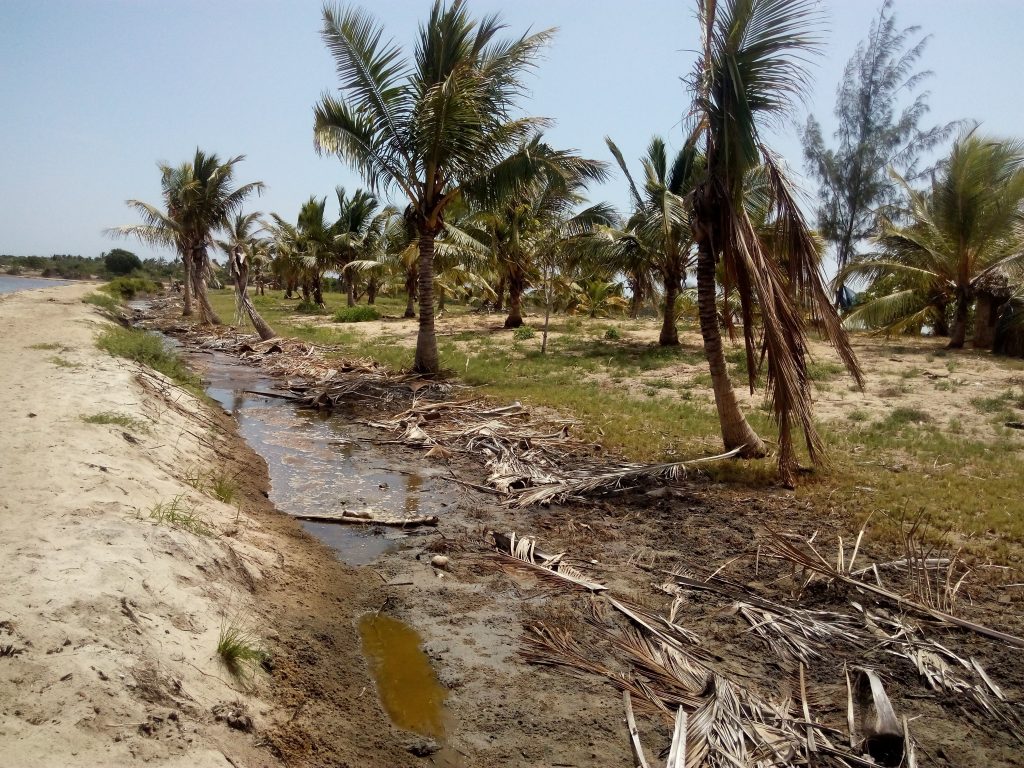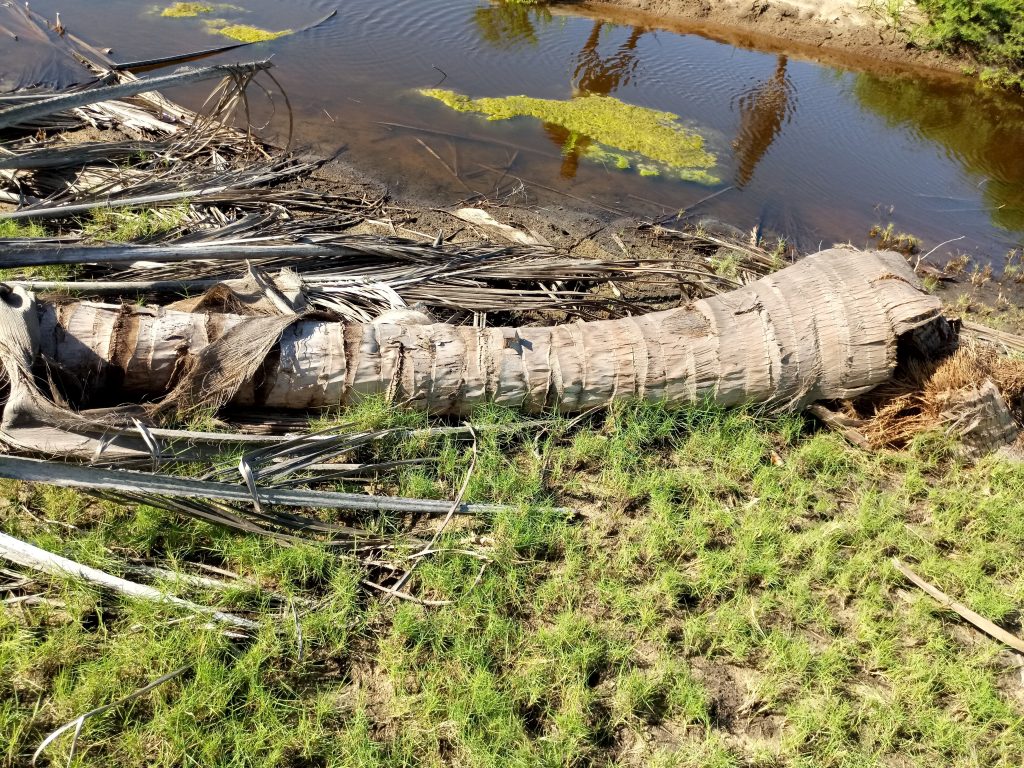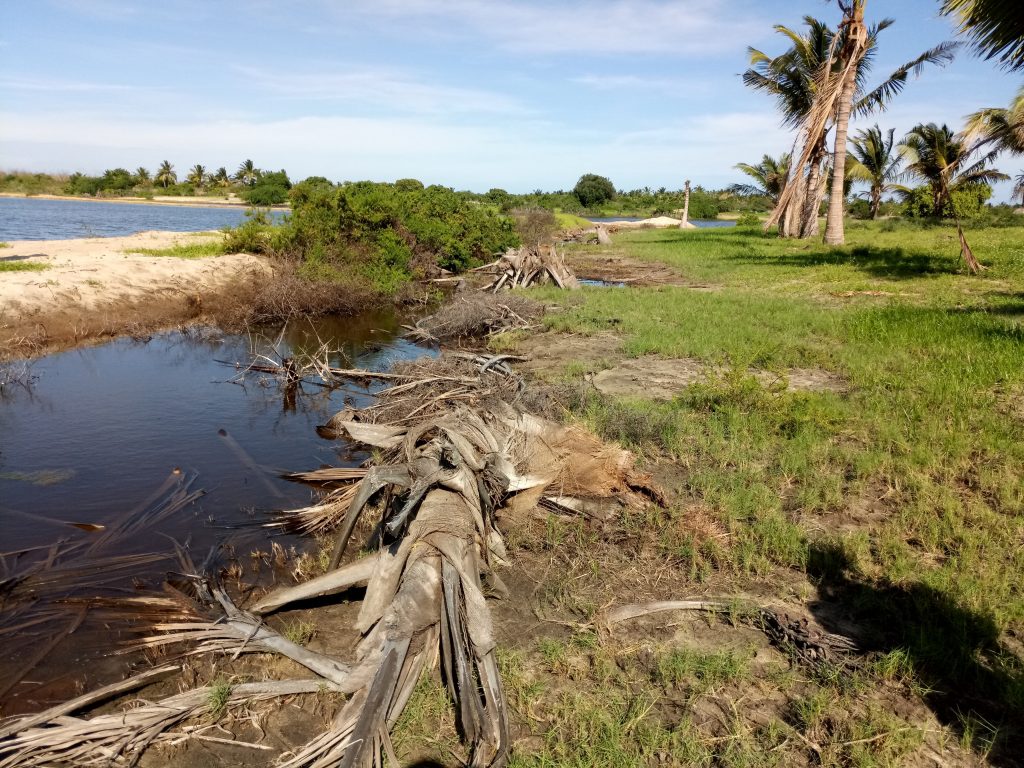In Magarini Sub County, Kilifi County of Kenya, 1500 acres of land belong to Kurawa Industries Limited, a prominent salt producing company. Salt is produced by the establishment of massive salt pans on hundreds of hectares of land. This company borders mangrove forests on the coastline of the Indian Ocean to its east and the Giriama community surrounds it on all other sides.
To the south lives a small family of three individuals, who also own a zebu cow and a couple of poultry birds. This is the Mwangi* family. This family has lived on approximately two acres of land for over 15 years. This land was once strewn with coconut cash crops that provided a source of livelihood for the Mwangi family. Only hollow, rotting trunks and decaying branches remain. Most of the coconut trees have died as a result of illegal expansion of the company’s salt pans from 2017 onwards. Coupled with poorly constructed dykes, this has allowed water to seep into the once agriculturally-productive area, rendering it saline and killing the only livelihood source sustaining this family.
Natural Justice, through its Community Environmental Legal Officer programme, is attempting to defend the livelihood and the right of this family to a clean and healthy environment by trying to alleviate the impacts of the salt company’s activities. The salt pans literally threaten their survival as they have watched their only source of livelihood snuffed out. But our attempts to help this family have seen so many challenges.

At least five written Access to Information requests have been made to the National Environment Management Authority (NEMA), the supervisory body mandated with protection of the environment and also most importantly, with the authority to license environmental projects after an environmental impact assessment has been undertaken and submitted. These information requests initially fell on deaf ears.
Fortunately, after three months, we received a response from NEMA’s head office in Nairobi and we were furnished with an Environmental Impact Assessment report and a license, which was for a different activity. Could it be that the salt company had expanded with devastating consequences for the Mwangi family without a license as required by the law?
This roused our suspicion and we set out to establish whether the expansion had been licensed or was operating illegally without a license.
We then approached the Department of Physical Planning in Kilifi County to establish if they issued a permit under the Physical Planning Act. In order to be issued with a permit, the salt company would have been required to first submit drawings and plans of their dykes for them to be approved before construction. We established that there was no application done by the company for such an activity. This confirmed our conclusion that the salt pan expansion was indeed illegal.
We wrote to the NEMA Director General regarding the non-compliance of the company. We also highlighted the breach of an Environmental Audit done by the company in 2014 that restricted salt production to the salt producing zones only, but this also fell on deaf ears. All this while the effects of salinity kept on spreading.
Just before the COVID-19 pandemic lockdown, we had asked an Agricultural Officer from the Magarini Sub County to conduct a site visit to assess the crops that were damaged and prepare a report that would be used to calculate the compensation due to the Mwangi family. His attendance was facilitated but, unfortunately, he has not yet written his report, citing the need of having a company representative present during the visit and assessment.
Meanwhile, the coconut tree stumps and trunks are busy decomposing, which would be vital as evidence to be used in the agricultural assessment report.

With Kilifi County under lockdown, the county departments have also somewhat suspended their operations and are instead taking an extremely long time to respond and address issues brought to their attention. But has the pandemic really suspended the law? Certainly not! Finding a remedy to this very important issue is crucial because, as time goes, the evidence of the impacts of water salinity on Mwangi’s family crops is being eroded, which in turn will have an effect on the assessment of damages for compensation. This hangs by the thread.
While their hope hangs on this solution, the pandemic has not been kind to them. With the lockdown in the county, the family is now more vulnerable than ever. With the restrictions imposed on movement, Mwangi’s access to her main source of water has also been limited. Where she once could walk an hour to fetch water for domestic use for her family, this has become difficult and dangerous.
With the government’s recent announcement that they have spent Kshs.40 Billion shilling on the COVID-19 response, you wonder where the money is being channeled. We doubt it will be going to community members like Mwangi. After all, “prevention is better than cure” is just but a song to the government of Kenya. We need the County departments to act now, as we have lives depending on their actions.
*Not their real names

